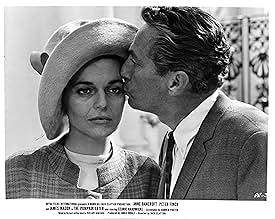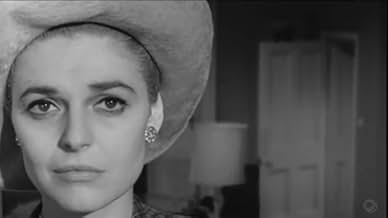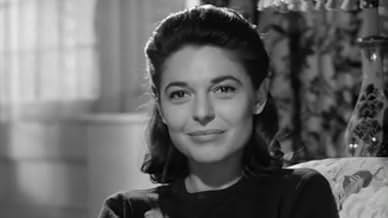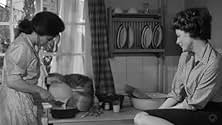NOTE IMDb
7,1/10
3,1 k
MA NOTE
Ajouter une intrigue dans votre langueBeautiful mother of five Jo leaves the banality of her marriage to second husband Giles to wed her passionate screenwriter lover, Jake Armitage. As her suspicion of Jake's philandering grows... Tout lireBeautiful mother of five Jo leaves the banality of her marriage to second husband Giles to wed her passionate screenwriter lover, Jake Armitage. As her suspicion of Jake's philandering grows, Jo's sanity spirals.Beautiful mother of five Jo leaves the banality of her marriage to second husband Giles to wed her passionate screenwriter lover, Jake Armitage. As her suspicion of Jake's philandering grows, Jo's sanity spirals.
- Réalisation
- Scénario
- Casting principal
- Nommé pour 1 Oscar
- 6 victoires et 6 nominations au total
Lesley Nunnerley
- Waitress at Zoo
- (as Leslie Nunnerley)
Avis à la une
I came upon this movie on late night t.v. a few years back. I really love Anne Bancroft and I think that she is, not underrated, but more correctly, overlooked as a great actress. This film is a wonderful study of a marriage in trouble and Ms. Bancroft and the great Peter Finch are so believable as lovers and as a married couple that I wondered why I had never even heard of the film before. I felt their pain - wait, sorry . . . I think someone else named Clinton coined that phrase. But seriously, Anne Bancroft is able to really convey heartbreaking loneliness that you just want to cry or help her in some way. I love movies that engage you thoroughly. If you enjoy movies that make you think and also have a viewpoint about human relations, please try to find this film. An added bonus is a wonderful appearance in a small role by Maggie Smith - certainly a very early one in her career. I really like finding gems like this!
10andya-5
The Pumpkin Eater, which for many years was my favorite movie, is a neglected masterpiece of the British New Wave. I'm not sure whether its lack of recognition is attributable more to its misanthropic point of view or to Jack Clayton's sparse filmography (he never developed the immediately recognizable personal style required for elevation to the auteur pantheon). It didn't help that initial reviewers badly misunderstood the film -- Dwight Macdonald thought it was a typical "women's film", meant to provide erotic titillation! On the other hand, feminist critics probably weren't eager to defend a film that could be interpreted as anti-abortion propaganda (also a misreading). Perhaps a more mature feminism will reclaim this film.
Admittedly, the movie is difficult to understand on a first viewing -- both because of its intricate flashback structure and its complexities of tone and attitude. It took me several viewings to fully sort out the plot, and several more to realize what I was actually seeing -- a very, very black comedy. In this respect it's worth placing with the darkest works of Evelyn Waugh or Henry Green.
The film catches its participants at the top of their form: Pinter never wrote a better screenplay, Anne Bancroft (arguably) never gave a better performance, Peter Finch certainly didn't, and Maggie Smith and James Mason are deliciously evil in supporting roles. There are too many marvelous moments to list them all, but watch especially for the zoo scene between Bancroft and Mason (who are clearly having a great time) and for the slyly-written scene where Finch learns that his wife is pregnant -- again.
So why is it no longer my favorite movie? My admiration for its technique is unabated, but as I get older I find the film's nasty tone harder and harder to take. There's not an admirable human being in the whole movie -- they're all foolish, duplicitous, or vindictive. I can't live with these people, much as I've enjoyed eavesdropping on them over the years.
Admittedly, the movie is difficult to understand on a first viewing -- both because of its intricate flashback structure and its complexities of tone and attitude. It took me several viewings to fully sort out the plot, and several more to realize what I was actually seeing -- a very, very black comedy. In this respect it's worth placing with the darkest works of Evelyn Waugh or Henry Green.
The film catches its participants at the top of their form: Pinter never wrote a better screenplay, Anne Bancroft (arguably) never gave a better performance, Peter Finch certainly didn't, and Maggie Smith and James Mason are deliciously evil in supporting roles. There are too many marvelous moments to list them all, but watch especially for the zoo scene between Bancroft and Mason (who are clearly having a great time) and for the slyly-written scene where Finch learns that his wife is pregnant -- again.
So why is it no longer my favorite movie? My admiration for its technique is unabated, but as I get older I find the film's nasty tone harder and harder to take. There's not an admirable human being in the whole movie -- they're all foolish, duplicitous, or vindictive. I can't live with these people, much as I've enjoyed eavesdropping on them over the years.
"The Pumpkin Eater" is the story of a bad marriage and a character study of the wife, Jo Armitage (Anne Bancroft) and a partial study of the husband, Jake (Peter Finch). Directed by Jack Clayton and with a screenplay by Harold Pinter, the film has a good deal that is unspoken; it's obtuse at times and can leave the viewer with a lot of questions. It's not a film for everyone, as it moves slowly - I can't see audiences of today going for it - it's totally character driven.
Jo is a woman whose fulfillment comes from children and pregnancy. We first see her standing in her home with a stunned look on her face and reminiscing about different facets of her life. One facet is as a happy young woman living in a barn and being introduced to fledgling screenwriter Jake by her second husband. In the next flashback, she's with Jake and discussing the upcoming marriage with her father (Cedric Hardwicke). He's blunt - she has too many kids - so he offers to pay to send the two oldest boys to boarding school, and he also leases a house for them.
The film is not entirely in flashback. It switches back and forth and finally settles in the present. Quite early on, we return to Jo today standing in the house. She goes to Harrod's and has a nervous breakdown.
Jo is in love with a man who loves her as best he can, but it's not enough for her. They have a child together, and though he loves and is good to all of the children, they get in the way of his relationship with Jo. He invites her to a film set in Morocco; she doesn't go. She becomes pregnant again; he tells her that he thought at this point, with the money they have, that they would be free to travel. Now they're back where they started. We suspect when we meet a young woman, Philpot (Maggie Smith) who stays with the family for a time because she's been put out of her flat, that Jake cheats. Jo suspects it; he denies it. Then she gets some devastating news from an odd friend (James Mason).
One is really left with a bad feeling about marriage, and as someone on this board pointed out, it's easy to see both sides of the situation. The psychiatrist Jo sees asks her, can she only justify having sex if she becomes pregnant? When the psychiatrist tells her he's going away for two weeks and can't see her, he tries to make future appointments and she says she can't make it. She evidently feels rejection very easily. Jo needs to be needed and wanted, and she loves the honeymoon -the new man, the new baby - but she can't handle much of the aftermath.
The film doesn't take sides. It's a fascinating story of what two people can do to one another and what people attract into their lives.
Anne Bancroft is one of the greatest actresses of all time and one of the most ravishingly beautiful. You'll never see her name in a list of top beauties because even with her huge, luminous eyes, her classically sculpted face, her thick hair and her gorgeous smile and her husky voice, she was never about her looks. She was always about a great, committed performance. Bancroft does more with her eyes and facial expressions here than most actresses can do with a ton of dialogue. The camera doesn't love her, it adores her, and here closeups are used to great advantage. Her performance is quietly stunning, quietly shattering, just like her face. She devastates the viewer here in a different way from her more overt performance in "The Miracle Worker," but she still devastates. What a loss to film and the theater.
Peter Finch is excellent as Jake - very handsome and sexy, warm with the children - you could really see why he was so adored by women, and I for one didn't understand why Jo wasn't on every film set with him all day, every day. He's two men, really - he's a husband who does love his wife, but he's emotionally childish as well and takes his frustrations and anger out by sleeping with other women.
"The Pumpkin Eater" is one of those films that you might not even care for while watching it. You might not even totally get what's going on all the time, but it will stay with you. You'll go over it in your head, and you won't forget it. In this way, it reminds me of two brilliant movies, "Damage" and "In the Bedroom" - like those films, "The Pumpkin Eater" is a harrowing experience.
Jo is a woman whose fulfillment comes from children and pregnancy. We first see her standing in her home with a stunned look on her face and reminiscing about different facets of her life. One facet is as a happy young woman living in a barn and being introduced to fledgling screenwriter Jake by her second husband. In the next flashback, she's with Jake and discussing the upcoming marriage with her father (Cedric Hardwicke). He's blunt - she has too many kids - so he offers to pay to send the two oldest boys to boarding school, and he also leases a house for them.
The film is not entirely in flashback. It switches back and forth and finally settles in the present. Quite early on, we return to Jo today standing in the house. She goes to Harrod's and has a nervous breakdown.
Jo is in love with a man who loves her as best he can, but it's not enough for her. They have a child together, and though he loves and is good to all of the children, they get in the way of his relationship with Jo. He invites her to a film set in Morocco; she doesn't go. She becomes pregnant again; he tells her that he thought at this point, with the money they have, that they would be free to travel. Now they're back where they started. We suspect when we meet a young woman, Philpot (Maggie Smith) who stays with the family for a time because she's been put out of her flat, that Jake cheats. Jo suspects it; he denies it. Then she gets some devastating news from an odd friend (James Mason).
One is really left with a bad feeling about marriage, and as someone on this board pointed out, it's easy to see both sides of the situation. The psychiatrist Jo sees asks her, can she only justify having sex if she becomes pregnant? When the psychiatrist tells her he's going away for two weeks and can't see her, he tries to make future appointments and she says she can't make it. She evidently feels rejection very easily. Jo needs to be needed and wanted, and she loves the honeymoon -the new man, the new baby - but she can't handle much of the aftermath.
The film doesn't take sides. It's a fascinating story of what two people can do to one another and what people attract into their lives.
Anne Bancroft is one of the greatest actresses of all time and one of the most ravishingly beautiful. You'll never see her name in a list of top beauties because even with her huge, luminous eyes, her classically sculpted face, her thick hair and her gorgeous smile and her husky voice, she was never about her looks. She was always about a great, committed performance. Bancroft does more with her eyes and facial expressions here than most actresses can do with a ton of dialogue. The camera doesn't love her, it adores her, and here closeups are used to great advantage. Her performance is quietly stunning, quietly shattering, just like her face. She devastates the viewer here in a different way from her more overt performance in "The Miracle Worker," but she still devastates. What a loss to film and the theater.
Peter Finch is excellent as Jake - very handsome and sexy, warm with the children - you could really see why he was so adored by women, and I for one didn't understand why Jo wasn't on every film set with him all day, every day. He's two men, really - he's a husband who does love his wife, but he's emotionally childish as well and takes his frustrations and anger out by sleeping with other women.
"The Pumpkin Eater" is one of those films that you might not even care for while watching it. You might not even totally get what's going on all the time, but it will stay with you. You'll go over it in your head, and you won't forget it. In this way, it reminds me of two brilliant movies, "Damage" and "In the Bedroom" - like those films, "The Pumpkin Eater" is a harrowing experience.
There are scenes from this movie that have been burned into my memory for years-- Anne Bancroft being accosted a crazed and lonely housewife while in a beauty parlor, her nervous breakdown in the middle of Harrod's in London, James Mason revealing her husband's infidelity to her cruelly while having tea at the zoo-- The Pumpkin Eater is one of my favorite movies. Anne Bancroft never gave a better performance-- she is startlingly good-- plus the excellent Harold Pinter screenplay and the brilliant direction of Jack Clayton-- this film is an eloquent essay on isolation and emptiness among other things. I recommend this film to all serious students of acting, writing, and directing. What a brilliant performance by the great Anne Bancroft. She won many awards for inc,, and should have won the Oscar Award also.
Jo Armitage (Anne Bancroft) seems to be losing it while her husband Jake (Peter Finch) is unable or unwilling to help. In flashbacks, Jake is shown to be her third husband after having several children. She continues to have children with Jake. Jake sends Jo to a psychiatrist. He suggests that Jo wants to sanctifies sex by reproducing. While Jake is a good provider, she suspects him of improprieties. After getting pregnant, the psychiatrist and Jake suggest getting an abortion and sterilization. After the operation, things are going great and then Bob Conway (James Mason) brings evidence that Jake is cheating with his wife.
The title refers to the nursery rhyme Peter Peter Pumpkin Eater. Jo is a perplexing character. She is struggling but she is not crazy. It is an interesting character but I am of two minds about it. It allows Bancroft to do some good acting but it is also hard to fully invest in her. There is an attempt at surrealism with the cigarette smoke going backwards. Maybe more of that surrealism would allow the audience to feel her troubled mind.
The title refers to the nursery rhyme Peter Peter Pumpkin Eater. Jo is a perplexing character. She is struggling but she is not crazy. It is an interesting character but I am of two minds about it. It allows Bancroft to do some good acting but it is also hard to fully invest in her. There is an attempt at surrealism with the cigarette smoke going backwards. Maybe more of that surrealism would allow the audience to feel her troubled mind.
Le saviez-vous
- AnecdotesThis movie never explains its title, which refers to a traditional children's rhyme: "Peter, Peter, pumpkin eater/Had a wife, but couldn't keep her/So he put her in a shell/And there he kept her very well." This serves as the epigraph of Penelope Mortimer's original novel.
- GaffesIn the shot after Jake pours out his drink on Conway, the film is being run backwards for some reason, as the smoke from the cigarette clearly indicates.
- Citations
[last lines]
Jo Armitage: Yes. I'll have one.
- ConnexionsFeatured in James Mason: The Star They Loved to Hate (1984)
Meilleurs choix
Connectez-vous pour évaluer et suivre la liste de favoris afin de recevoir des recommandations personnalisées
- How long is The Pumpkin Eater?Alimenté par Alexa
Détails
- Date de sortie
- Pays d’origine
- Langue
- Aussi connu sous le nom de
- The Pumpkin Eater
- Lieux de tournage
- Turville, Buckinghamshire, Angleterre, Royaume-Uni(Cobstone Windmill - the Armitage's country house with views of town below)
- Société de production
- Voir plus de crédits d'entreprise sur IMDbPro
- Durée
- 1h 58min(118 min)
- Couleur
- Rapport de forme
- 1.85 : 1
Contribuer à cette page
Suggérer une modification ou ajouter du contenu manquant






































